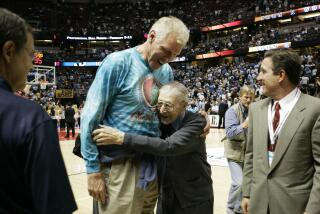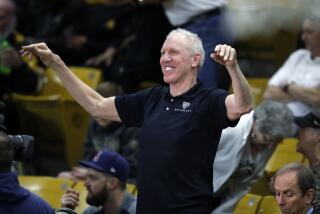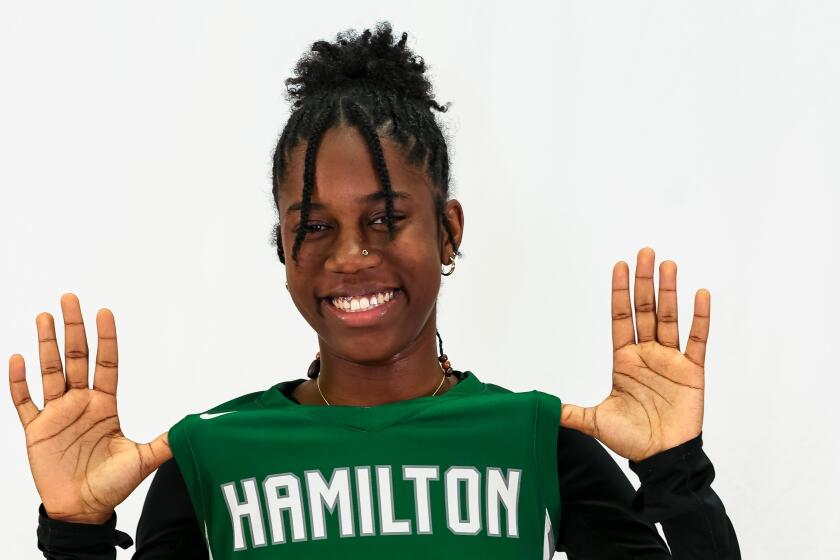Valvano Loses Fight With Cancer : College basketball: Respected but embattled, the former coach and commentator dies at 47 after a 10-month battle.
Florida State basketball coach Pat Kennedy said recently of his mentor and former boss Jim Valvano: “We always thought Jimmy had nine lives, but I guess he only has one like the rest of us.”
That life ended Wednesday when Valvano, 47, lost a 10-month battle with cancer.
“He put up a good fight. It’s amazing what a constitution he had,” said Atlantic Coast Conference commissioner Gene Corrigan. “I don’t know how many of us could have done what he did.”
Valvano’s death came a little more than 10 years after he vaulted onto the national stage by leading North Carolina State to an NCAA championship with a huge upset of Houston.
Winning the national championship helped Valvano become one of the most recognized and respected coaches in the game, but he later became one of the most embattled. He eventually was forced out at N.C. State in 1990, with the Wolfpack on NCAA probation.
It was in Baltimore that Valvano began his 20-year head-coaching career. At 23, Valvano was hired to coach at Johns Hopkins in 1969. He spent only one season there, but he made an immediate and lasting impression.
“He had been an assistant at Rutgers for one year after playing there, and the Rutgers people said he was so knowledgeable, so good with the kids,” recalled Hopkins athletic director Bob Scott, then the school’s lacrosse coach. “They were right. We knew then that he’d be coaching at the highest level of basketball someday. He had a real pizazz about him. We used to have to hold our sides from laughing so hard at some of his stories.”
Valvano went from Johns Hopkins to the University of Connecticut, where he was an assistant under Dee Rowe for two years. He left there to become a head coach again, this time at Bucknell. It was at Bucknell that Valvano’s coaching style began to develop.
Once, when the team was going through a long losing streak, he promised his players that he would suit up for warm-ups if they won five games in a row. They did -- and he did. But Valvano had bigger dreams than Bucknell, and he left there after three seasons to become head coach at Iona College.
It was at Iona that Valvano’s reputation as one of the best sideline strategists -- as well as one of the most quotable coaches in the business -- grew. When he was first hired, Valvano often said people compared him to then-New York Jets quarterback Joe Namath.
“They say that Joe Namath is ruggedly handsome; they just say I have a big nose,” said Valvano.
He spent five years at the small school in New Rochelle, N.Y., and he used to kid about the introduction he gave himself at camps and clinics. “I’d tell people, ‘I’m Jim Valvano, Iona College.’ And they’d tell me, ‘Son, you’re too young to own a college.’ ”
Said Baltimore businessman Bill Gaertner, one of his assistants for three years at Iona: “Jimmy used to say, ‘The game isn’t over until the last writer leaves.’ ”
Despite a career that was filled with rim shots as well as jump shots, Valvano was serious about making it in big-time college basketball. After turning Iona into a regional power, after upsetting soon-to-be national champion Louisville in 1980 at Madison Square Garden, Valvano was hired at N.C. State.
“I think Jimmy Valvano is the kind of coach who can bring us back to the national championship,” former Wolfpack athletic director Willis Casey said at the time.
Three years later, he did. After winning the ACC tournament to gain a bid to the NCAA tournament, N.C. State won a series of down-to-the-wire games, ending with an improbable victory over top-ranked Houston in the championship.
Coming back to beat Phi Slamma Jamma on the game’s final play -- an airball by Dereck Whittenburg turned into a dunk at the buzzer by Lorenzo Charles -- Valvano took off on a mad dash around the court, looking for someone to hug. “My luck, I ended up finding a 60-year-old man,” Valvano said, referring to Casey.
It turned out to be the highlight of Valvano’s career and the launching pad to his second career: selling Jimmy V. He was praised by his fellow coaches for becoming an entrepreneur, and was criticized by the media for not paying attention to his program, especially to many academically deficient players.
Perhaps the last shining moment for Valvano as a coach came in 1987, when his Wolfpack upset North Carolina in the final of the ACC tournament. By 1989, after the publication of “Personal Fouls,” a critical account of the N.C. State program, Valvano found himself in a swirl of controversy. Having succeeded the retiring Casey as athletic director, Valvano was forced to resign the position. He remained as basketball coach as the program began a two-year period of probation.
In the spring of 1990, with N.C. State under investigation again for a number of violations not tied directly to him, Valvano was forced to resign as head coach. He nearly returned to the sidelines twice, first at Wichita State and later with the New Jersey Nets. But his television career was beginning to blossom, and he won an ACE award -- the cable television equivalent of an Emmy -- for his work as an analyst on ESPN.
“He’s one of the brightest, funniest guys in the business,” said Brent Musburger, who worked with Valvano on ABC, including his final broadcast March 7 of the Duke-North Carolina game in Chapel Hill, N.C.
The jokes stopped after Valvano became seriously ill last summer, when he was diagnosed with a usually fatal form of bone cancer. By the time the cancer was found last June, the tumors had spread to his spine.
After going into near-seclusion while starting chemotherapy treatments, Valvano went back to work at the start of the 1992-93 college season and went public with his fight against cancer. With the help of his colleagues at ESPN, Valvano started The Jimmy V Foundation to raise money to battle the disease.
Despite being in obvious pain, Valvano continued to work almost non-stop during the past season, including a game at N.C. State when he and members of the 1983 championship were honored. It was Valvano’s first trip back to his former school, and there wasn’t a dry eye at Reynolds Coliseum after he gave an emotional speech.
His last public appearance came at last month’s ESPY awards in New York, where he received the Arthur Ashe Award for Courage. Though he needed to be helped up the stairs leading to the stage, those running the show nearly couldn’t get him off.
When a producer signaled for him to wrap up his speech, Valvano joked that a guy in his condition wasn’t going to worry about a few seconds. Those who didn’t know Valvano were surprised at his resolve, but those who knew him weren’t.
“He had more energy than 10 people combined,” said Kennedy, who visited Valvano last week. “It (the TV work) was his therapy. It kept him alive.”
After his chemotherapy was changed last month, Valvano’s condition worsened. He went into the hospital at Duke twice, most recently last week. He died there Wednesday.
Valvano, whose late father, Rocco, was a high school basketball coach and college referee, is survived by his wife, Pam, three daughters, his mother and two brothers. His younger brother, Bob, is the coach at St. Mary’s College in Maryland.
“Jimmy was one of a kind,” said Corrigan, who had his own brush with prostate cancer a couple of years ago. “I think one of the things he said at the ESPY awards I’ll always remember. He said that you should laugh and cry every day. I think we’re doing a little of both today.”
More to Read
Go beyond the scoreboard
Get the latest on L.A.'s teams in the daily Sports Report newsletter.
You may occasionally receive promotional content from the Los Angeles Times.










